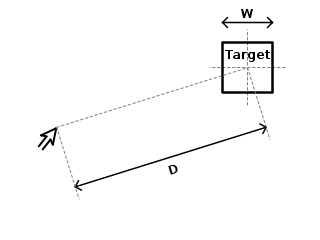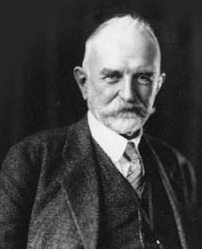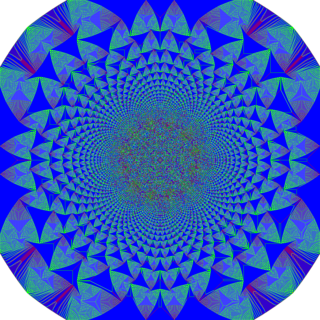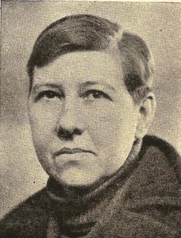
In mathematics, fractal is a term used to describe geometric shapes containing detailed structure at arbitrarily small scales, usually having a fractal dimension strictly exceeding the topological dimension. Many fractals appear similar at various scales, as illustrated in successive magnifications of the Mandelbrot set. This exhibition of similar patterns at increasingly smaller scales is called self-similarity, also known as expanding symmetry or unfolding symmetry; if this replication is exactly the same at every scale, as in the Menger sponge, the shape is called affine self-similar. Fractal geometry lies within the mathematical branch of measure theory.

In chemistry, pH, historically denoting "potential of hydrogen" (or "power of hydrogen") is a scale used to specify the acidity or basicity of an aqueous solution. Acidic solutions (solutions with higher concentrations of H+ ions) are measured to have lower pH values than basic or alkaline solutions.

Fitts's law is a predictive model of human movement primarily used in human–computer interaction and ergonomics. This scientific law predicts that the time required to rapidly move to a target area is a function of the ratio between the distance to the target and the width of the target. Fitts's law is used to model the act of pointing, either by physically touching an object with a hand or finger, or virtually, by pointing to an object on a computer monitor using a pointing device. It was initially developed by Paul Fitts

In personality typology, the Myers–Briggs Type Indicator (MBTI) is an introspective self-report questionnaire indicating differing psychological preferences in how people perceive the world and make decisions. The test attempts to assign four categories: introversion or extraversion, sensing or intuition, thinking or feeling, judging or perceiving. One letter from each category is taken to produce a four-letter test result, such as "INTJ" or "ESFP".
Self-esteem is an individual's subjective evaluation of their own worth. Self-esteem encompasses beliefs about oneself as well as emotional states, such as triumph, despair, pride, and shame. Smith and Mackie (2007) defined it by saying "The self-concept is what we think about the self; self-esteem, is the positive or negative evaluations of the self, as in how we feel about it."
In mathematics, more specifically in fractal geometry, a fractal dimension is a ratio providing a statistical index of complexity comparing how detail in a pattern changes with the scale at which it is measured. It has also been characterized as a measure of the space-filling capacity of a pattern that tells how a fractal scales differently from the space it is embedded in; a fractal dimension does not have to be an integer.

Self-organization, also called spontaneous order, is a process where some form of overall order arises from local interactions between parts of an initially disordered system. The process can be spontaneous when sufficient energy is available, not needing control by any external agent. It is often triggered by seemingly random fluctuations, amplified by positive feedback. The resulting organization is wholly decentralized, distributed over all the components of the system. As such, the organization is typically robust and able to survive or self-repair substantial perturbation. Chaos theory discusses self-organization in terms of islands of predictability in a sea of chaotic unpredictability.

George Herbert Mead was an American philosopher, sociologist, and psychologist, primarily affiliated with the University of Chicago, where he was one of several distinguished pragmatists. He is regarded as one of the founders of symbolic interactionism and of what has come to be referred to as the Chicago sociological tradition.

Latent homosexuality is an erotic attraction toward members of the same sex that is not consciously experienced or expressed in overt action. This may mean a hidden inclination or potential for interest in homosexual relationships, which is either suppressed or not recognized, and which has not yet been explored, or may never be explored.
Dissociation, as a concept that has been developed over time, is any of a wide array of experiences, ranging from a mild emotional detachment from the immediate surroundings, to a more severe disconnection from physical and emotional experiences. The major characteristic of all dissociative phenomena involves a detachment from reality, rather than a loss of reality as in psychosis.
In physics, length scale is a particular length or distance determined with the precision of at most a few orders of magnitude. The concept of length scale is particularly important because physical phenomena of different length scales cannot affect each other and are said to decouple. The decoupling of different length scales makes it possible to have a self-consistent theory that only describes the relevant length scales for a given problem. Scientific reductionism says that the physical laws on the shortest length scales can be used to derive the effective description at larger length scales. The idea that one can derive descriptions of physics at different length scales from one another can be quantified with the renormalization group.

Self-organized criticality (SOC) is a property of dynamical systems that have a critical point as an attractor. Their macroscopic behavior thus displays the spatial or temporal scale-invariance characteristic of the critical point of a phase transition, but without the need to tune control parameters to a precise value, because the system, effectively, tunes itself as it evolves towards criticality.
Locus of control is the degree to which people believe that they, as opposed to external forces, have control over the outcome of events in their lives. The concept was developed by Julian B. Rotter in 1954, and has since become an aspect of personality psychology. A person's "locus" is conceptualized as internal or external.

Catherine Austin Fitts is an American investment banker and former public official who served as managing director of Dillon, Read & Co. and, during the Presidency of George H.W. Bush, as United States Assistant Secretary of Housing and Urban Development for Housing. She has widely written and commented on the subject of public spending and has alleged several large-scale instances of government fraud. She has been an advocate of several conspiracy theories, most notably the 'global technocracy' theory, which has developed rapidly during the COVID-19 pandemic and about which she has recorded a lengthy interview as part of the 'Planet Lockdown' conspiracy advocate series.
In psychology, discriminant validity tests whether concepts or measurements that are not supposed to be related are actually unrelated.
In Greek mythology, Horme is the Greek spirit personifying energetic activity, impulse or effort, eagerness, setting oneself in motion, and starting an action, and particularly onrush in battle. She had an altar at Athens, where mainly the divine servants and relations of Zeus had altars. Her opposite character is Aergia, a goddess of sloth and apathy. The word "horme" is also used to refer to the philosophical concept represented by the goddess.

Kathleen Freeman was a British classical scholar and author of detective novels. Her detective fiction was published under the pseudonym Mary Fitt. Freeman was a lecturer in Greek at the University College of South Wales and Monmouthshire, Cardiff between 1919 and 1946.
Ralph Wilbur Hood Jr. is an American psychologist. He serves as Leroy A. Martin Distinguished Professor of Religious Studies at the University of Tennessee at Chattanooga, where he specializes in the psychology of religion.
The Vermont Bar Association (VBA) is a voluntary bar association for the state of Vermont.

Michael Andrew Fitts is an American legal scholar who is the current president of Tulane University in New Orleans, Louisiana, and the Judge Rene H. Himel Professor of Law at the Tulane School of Law. He is a former Dean of the University of Pennsylvania Law School. He is also the author of numerous articles that have appeared in the Harvard Law Journal and other prestigious scholarly publications.










